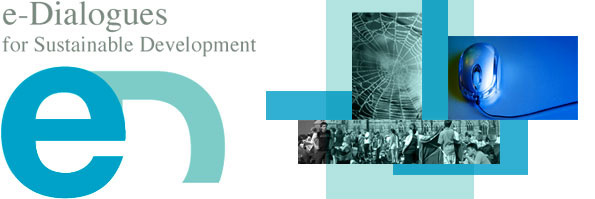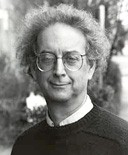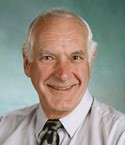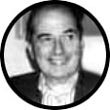|
The purpose of this e-dialogue was to explore the relationship between social capital and sustainable development, and specifically how social capital contributes to local, community development. Each day of the dialogue explored one of the following questions:
- What is social capital?
- What is the relationship between social capital and sustainable development?
- Who can build or destroy social capital?
We thank the panelists for their participation and the richness of their contributions. We also would like to thank all those who came to observe the panel discussion and participate in the audience forum.
Panelist statements have been archived verbatim; however, given the software used was not synchronous, certain panelist statements have been reorganized to maintain the logical flow of the discussion.
The following documentation has been archived as part of the dialogue:
- The complete dialogue, as a PDF document (445 KB)
- A summary of the dialogue
- Background readings on social capital
- The panelists, with their bios
| Moderator |
complete e-Dialogue (pdf) |
|
Judith Maxwell, President,
Canadian Policy Research Networks
Judith Maxwell is President and Founder of Canadian Policy Research Networks, whose mission is to create knowledge and lead public debate in order to help make Canada a more just, prosperous, and caring society.
CPRN research programs focus on health, family policy and work. In addition, its Public Involvement Program enables citizens to engage effectively in policy discussion on these issues. These activities involve collaboration by researchers in a number of universities and research agencies across Canada as well as the active participation of policy advisors and analysts in the public, private, and non-profit sectors. The research is funded by a variety of public and private sector organizations.
Mrs. Maxwell is an Adjunct Professor at the University of Ottawa, and is a Fellow of the School of Policy Studies at Queen's University. She is a member of the Board of Directors of Clarica (formerly the Mutual Life Assurance Company of Canada) and BCE Inc. among others. She is a member of the Order of Canada and has been awarded honorary degrees by seven Canadian Universities.
Mrs. Maxwell has long experience in both public sector and private sector think tanks. She was Chair of the Economic Council of Canada from 1985 to 1992. Prior to 1985, she worked as a consultant, as Director of Policy Studies at the C.D. Howe Institute and as a journalist |
|
| Panelists |
|
Herb Barbolet, Executive Director, Farm Folk/City Folk
|
|
Herb Barbolet is the Founder and Executive Director of FarmFolk/ CityFolk Society. Having worked in Community Development for 30 years, Herb was the founding member of numerous limited companies, cooperatives, and non-profits, including FarmFolk/CityFolk, which Herb is still with. FarmFolk/CityFolk strives for food democracy, with Herb at the forefront, working on issues of food security, food policy, agriculture, and related topics.
His BA is in Urbanism, MSW in Community Development and he managed to participate in two doctoral programmes: Community Development, and then Community Plannning and Political Economy through the first thesis draft stage before deciding he was an activist, not an academic.
|
|
He is a monthly participant on CBC Almanac's Food Panel and appears regularly in all media. Herb is co-author of "FarmFolk/CityFolk", the book, and is currently working on his second book. Many folks consider Herb Barbolet to be a prominent leader of the sustainable food movement in Canada.
|
Rod Dobell, Professor, School of Public Administration, University of Victoria
|
|
Rod Dobell is Professor of Public Policy at the University of Victoria. He completed his PhD in economics at MIT and took up a five-year appointment to teach economic theory at Harvard before returning to Canada as Professor of Political Economy at the University of Toronto. He has served as Deputy Secretary to the Treasury Board in the Government of Canada, Director of the General Economics Branch at OECD, Director of Research for two Parliamentary Task Forces, and as President of the Institute for Research on Public Policy, 1984-1991. In 1991 he was named as the first appointment to the Francis G. Winspear Chair for Research in Public Policy at the University of Victoria. |
|
He now calls himself an ecological socio-political economist—not because he knows any answers, but because he’s come to believe that’s the only way the questions can reasonably be framed.
Most recently he served as Principal Investigator leading the Canadian team in the ten-country Social Learning Group (Report published by MIT Press, 2001), and as a member of the expert panel on Canadian Marine Fisheries in a Changing and Uncertain World, set up by the Canadian Global Change Program of the Royal Society of Canada (Report published by NRC Press, 1999). He has served as President of the Canadian section of the North American Institute, and as President of the Maritime Awards Society of Canada, whose report last year on the public policy questions at issue in relation to the moratorium on offshore hydrocarbon exploration and development stimulated considerable media response, leading to the recent (January 2002) report of the British Columbia Scientific Panel on Offshore Hydrocarbon Exploration, for which he served as Project Director.
|
Greg MacLeod, Director, Tomkins Institute, University College of Cape Breton
|
|
Greg MacLeod, Director of the Tompkins Institute at the University College of Cape Breton, lives by the motto "The Best Education Is Learning By Doing". This has given him over twenty years experience in community economic development in Canada, and led to his being recognized as Canada's foremost authority on the subject. |
|
He is the founding chairperson of New Dawn Enterprises, which has grown to an annual budget of six million dollars and employs 175 people. He is also the founding chairperson of BCA Holdings, a community venture-finance company with assets of almost two million dollars. He authored "New Age Business", published by the Canadian Council on Social Development, "From Mondragon To America - experiments in community economic development", available in English and Japanese, and a series of case studies consisting of both books and videos.
Ordained in 1961, he completed his Ph.D. (La Plus Grande Distinction) in 1969 at the University of Louvain, Belgium, immediately began his post-graduate year at Balliol College, Oxford, UK. Dr. MacLeod has spent the last 25 years as a Professor of Philosophy at the University College of Cape Breton and organizing Economic Development Projects in Canada and Mexico. During the last several years he was an invited speaker for provincial government workshops in Manitoba, Saskatchewan and Yukon.
In recognition of his tireless efforts, he has received Honorary Doctorates from St. Francis Xavier University, Atlantic School of Theology, and Dalhousie University.
|
Peter Robinson, President, Mountain Equipment Coop & MEC's Sustainability Team
Peter Robinson is CEO of Mountain Equipment Coop, a retail consumer co-operative whose core purpose is "to support people in achieving the benefit of self propelled wilderness oriented recreation".
Peter began his career as a park ranger working in wilderness areas throughout British Columbia. He became CEO of Mountain Equipment Co-op in May of 2000, prior to which he was CEO of BC Housing, a provincial crown corporation.
Peter also does ongoing humanitarian work with the Red Cross, including previous missions in the United States to manage disaster shelters, and as a delegate monitoring prison conditions with the International Red Cross in Rwanda. He currently leads a team that monitors the conditions of Chinese migrants detained in Canada.
Peter holds a Bachelor of Arts in Geography, as well as diplomas in Community Economic Development and Fish & Wildlife Management. He is currently completing a Master's program in Conflict Analysis and Management at Royal Roads University. An avid outdoors person, Peter spends as much time as he can in the Coastal Mountains, or kayaking among the Gulf Islands.
James Tansey, Research Associate, Sustainable Development Research Institute, UBC
|
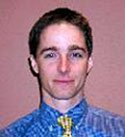
|
James Tansey is a Research Associate working on the Strategies component of the Georgia Basin Futures Project at the Sustainable Development Research Institute, University of British Columbia. He is currently working on a social capital project focused on resource dependent communities on Vancouver Island. |
|
James completed his PhD with the School of Environmental Sciences at the University of East Anglia, UK. His PhD thesis was a theoretical and empirical study of the concept of risk focusing on the work of anthropologist Mary Douglas. Case study research involved extensive fieldwork in Lithuania to explore the effects of the break up of the Soviet Union on the 'threats landscapes' of rural inhabitants. James has also worked with the energy sector in the UK and in particular the politically charged issue of the Brent Spar decommissioning which brought Shell and Greenpeace into conflict.
|
|
| Suggested Readings |
complete e-Dialogue (pdf) |
|
Baas, Stephan. "Institutional Participatory Development" http://www.fao.org/sd/ppdirect/ppan0012.htm
Canadian Policy Research Networks, "Social Cohesion: The State of Canadian Research"
http://www.cprn.org/en/doc.cfm?
Centre for Innovation in Management. "Measuring the Business Value of Stakeholder Relationships"
http://www.cim.sfu.ca/pages/research.htm
Chopra, Kanchan. 2001. "Social Capital and Sustainable Development: The Role of Formal and Informal Institutions in a Developing Country" http://iisd.ca/pdf/pe_social_capital_sd.pdf
Dobell, R. "Social Capital and Social Learning in a Full World". (Paper prepared for OECD.)
http://www.hrdc-drhc.gc.ca/arb/publications/books/oecd/en/15-dobell.pdf
Foundation, Jane E. "Social Capital: A Key Enabler of Innovation in Science and Technology"
http://www.ksg.harvard.edu/prg/fountain/soccap.htm
Fukuyama, Francis. "Social Capital and Civil Society": http://www.imf.org/external/pubs/ft/seminar/1999/reforms/fukuyama.htm
Grafton, R. Quentin and Knowles, Stephen. "Social Capital and National Environmental Performance: A Cross-sectoral Analysis"
http://een.anu.edu.au/download_files/een0206.pdf
Grootaert, Christiaan. "Social Capital: The Missing Link?" (for World Bank)
http://www.worldbank.org/poverty/scapital/wkrppr/sciwp3.pdf
Healy, Tom and Côté, Sylvain. "The Well-Being of Nations: the Role of Human and Social Capital" (OECD 2001), Executive Summary
http://www1.oecd.org/els/pdfs/EDSMINDOCA003.pdf
HRDC and OECD (2001), "The Contribution of Human and Social Capital to Sustained Economic Growth and Well-Being International Symposium Report"
http://www.hrdc-drhc.gc.ca/arb/publications/books/oecd/en/oecd_e.shtml
IRIS, Social Capital Initiative
http://www.iris.umd.edu/adass/proj/soccappubs.asp
ISUMA, Canadian Journal of Policy Research, vol. 2, no. 1, Spring 2001: "Social Capital"
http://www.isuma.net/v02n01/index_e.shtml
Kawachi, Ichiro. "Long Live Community: Social Capital as Public Health"
http://www.prospect.org/print/V8/35/kawachi-i.html
Kilpatrick, Sue et al. "The Role of Group Learning in Building Social Capital"
http://pandora.nla.gov.au/parchive/2000/Z2000-Aug-14/www.crlra.utas.edu.au/discussion/d3-1998.shtml
Krishna, Anirudh and Shrader, Elizabeth. "Social Capital Assessment Tool"(for World Bank)
http://www.worldbank.org/poverty/scapital/wkrppr/sciwp22.pdf
OECD (2001). "Policies to Enhance Sustainable Development"
http://www1.oecd.org/subject/mcm/2001/products/0001311E.pdf
Portes, Alejandro. "Social Capital: Its Origins and Applications in Modern Sociology"
http://e-dialogues.royalroads.ca/scdialogue/SCR%20Portes.pdf
Putnam, Robert D. "Bowling Alone: The Collapse and Revival of American Community"
http://www.bowlingalone.com/socialcapital.php3
Putnam, Robert D. "The Prosperous Community: Social Capital and Public Life"
http://www.prospect.org/print/V4/13/putnam-r.html
Schuller, Tom. "Thinking About Social Capital"
http://www.open.ac.uk/lifelong-learning/papers/393B8E05-0008-65B9-0000015700000157.html
Woolcock, Michael. "Friends in High Places? An Overview of Social Capital"
http://www.id21.org/insights/insights34/insights-iss34-art02.html
World Bank, Social Capital for Development
http://www.worldbank.org/poverty/scapital/index.htm
|
| Books |
|
|
Matthews, David. Politics for People. 2nd. Ed., University of Illinois Press, 1999
Siianni, Carmen and Lewis Friedland. Civic Innovation in America. University of California, 2001.
We would welcome your suggestions for seminal websites and resources on social capital. Please send your suggestions to: edialogues@royalroads.ca
|
|
